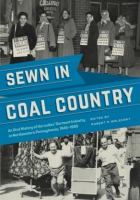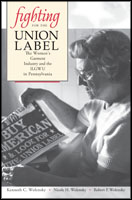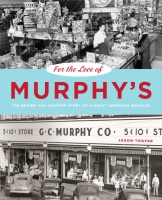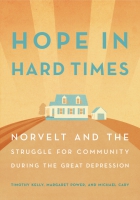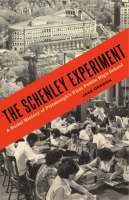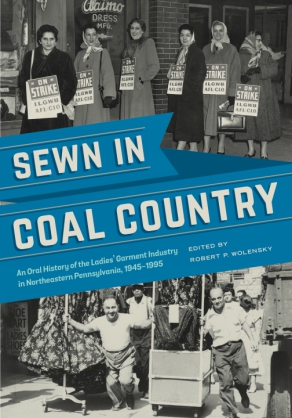
Sewn in Coal Country
An Oral History of the Ladies’ Garment Industry in Northeastern Pennsylvania, 1945–1995
Edited by Robert P. Wolensky
Sewn in Coal Country
An Oral History of the Ladies’ Garment Industry in Northeastern Pennsylvania, 1945–1995
Edited by Robert P. Wolensky
“Taking the measure, Wolensky has produced a valuable and informative work. It will serve as an important primary source, giving insights into not only the Wyoming Valley but also eastern Pennsylvania, its economy, its people, and the mores of the era it covers.”
- Description
- Reviews
- Bio
- Table of Contents
- Subjects
Drawing from an archive of over sixty audio-recorded interviews within the Northeastern Pennsylvania Oral and Life History Collection, Sewn in Coal Country showcases sixteen stories told by workers, shop owners, union leaders, and others. The interview subjects recount the ILGWU-led movement to organize the shops, the conflicts between the district union and the national office in New York, the solidarity unionism approach of leader Min Matheson, the role of organized crime within the business, and the failed efforts to save the industry in the 1980s and 1990s. Robert P. Wolensky places the narratives in the larger context of American clothing manufacturing during the period and highlights their broader implications for the study of labor, gender, the working class, and oral history.
Highly readable and thoroughly enlightening, this significant contribution to the study of labor history and women’s history will appeal to anyone interested in the relationships among workers, unions, management, and community; the effects of economic change on an area and its residents; the role of organized crime within the industry; and Pennsylvania history—especially the social history of industrialization and deindustrialization during the twentieth century.
“Taking the measure, Wolensky has produced a valuable and informative work. It will serve as an important primary source, giving insights into not only the Wyoming Valley but also eastern Pennsylvania, its economy, its people, and the mores of the era it covers.”
“[Sewn in Coal Country] is informative and abounds with unique, strong voices of people who worked to build the world they wanted to inhabit.”
“A detailed yet readable study of the lives of the garment industry. This is a fine social history of ordinary people that brings the past to life.”
“An important contribution to US labor history and twentieth-century US history. The interviews offer nuanced views and multiple perspectives on labor struggles in the region, offering particularly new and valuable views of the influence of geography on industrial development and the growth of the trade union movement and showing why we need a broad view to understand even local industrial history.”
Robert P. Wolensky is Professor Emeritus of Sociology at the University of Wisconsin–Stevens Point and Adjunct Professor of History at King’s College, Wilkes-Barre. He is the coauthor of Fighting for the Union Label: The Women’s Garment Industry and the ILGWU in Pennsylvania, also published by Penn State University Press.
List of Illustrations
Preface
Acknowledgments
List of Abbreviations
Introduction: Northeastern Pennsylvania and the Garment Industry
1. Dorothy “Dot” Ney: Garment Worker, Union Organizer, and Business Agent
2. William “Bill” Cherkes: Garment Shop Owner and Garment Association President
3. Minnie “Min” Matheson: Labor Leader, Social Activist, and ILGWU District Director
4. Angelo “Rusty” “Bill” DePasquale: Mineworker and ILGWU Organizer and “Enforcer”
5. Anthony “Tony” D’Angelo: Garment Presser and Barber
6. Alice Reca: Garment Worker, Union Organizer, and Business Agent
7. John “Johnny” Justin: Garment Worker, Labor Organizer, and ILGWU District Director
8. Clementine “Clem” Lyons: Garment Worker, Business Agent, and Chorus Performer and Director
Image Gallery
9. Helen Weiss: Garment Worker, Business Agent, and Chorus Performer
10. George and Lucy Zorgo: Union Printers and Labor Advocates
11. Philomena “Minnie” Caputo: Garment Worker, Union Activist, Chairlady, and Floorlady
12. Dr. Albert Schiowitz: Physician and Director of the Wyoming Valley ILGWU Health Center
13. Leo Gutstein: Family Garment Shop Owner and Garment Association President
14. Pearl Novak: Garment Worker, Union Organizer, and Social Activist
15. Betty Greenberg: Mother, Spouse, Activist, and the Mathesons’Daughter
16. Labor, Working-Class, Gender, and Oral History
Appendix 1: The Wyoming Valley Oral Histories
Appendix 2: Glossary of Selected Terms
Appendix 3: Biographical Sketches
Notes
Bibliography
Index
Mailing List
Subscribe to our mailing list and be notified about new titles, journals and catalogs.
